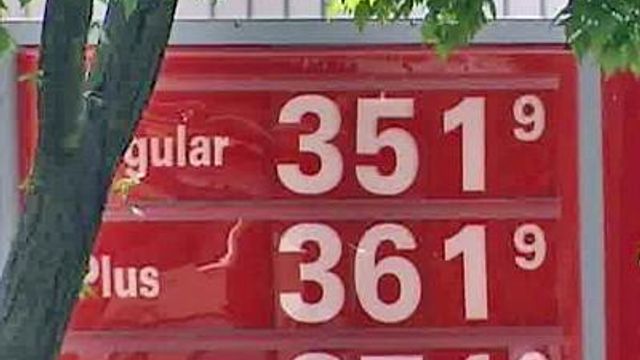Record Gas Prices Going Up, Up, Up
Prices at the pump have soared to a new record each of the past five days, and the U.S. Energy Department predicts they'll go even higher.
Posted — UpdatedRegionally, prices at the pump jumped 9 cents this work week. By Friday, some stations were posting prices as high as $3.51 for a gallon of regular unleaded gasoline, while the statewide average price sat around $3.42 a gallon.
Diesel prices averaged $4.102 statewide.
High prices might finally be affecting drivers' habits, economists said.
"We have finally in the industry seen a drop in demand, because it has gotten so high that we're starting to see where it's reaching that break point," Gary Harris, with the N.C. Petroleum & Convenience Marketers, said.
Some analysts expect gas prices to peak near $3.80 a gallon. The federal Energy Department, in a recent forecast, said prices could average $4 a gallon nationally at times.
Those highs surpass the $3.18-a-gallon mark to which gasoline prices surged after Hurricane Katrina disrupted supplies in August 2005. A year ago, Triangle gas prices sat at $2.870 a gallon.
Lindsay Schram said rising prices have made her switch the grade of fuel she uses.
"I have not been putting in premium the past couple weeks. I've been putting in regular because the prices are so high," Schram said.
Ritterbusch estimated that the average difference between what refiners pay for oil and receive for the gasoline they make from it stands somewhere between $13 and $15 a barrel. But in some areas, this difference has actually gone negative at times in recent weeks, meaning that refiners "were losing money on each barrel of gasoline produced," Ritterbusch said.
Gas prices also rise as refiners switch from producing winter grade gasoline to the more expensive, less polluting version of the fuel they are required to sell during summer. That annual practice draws down supplies as stations try to sell off all their winter fuel.
"I would say that energy prices are having the most profound effect on the economy in recent memory," said Phil Flynn, an analyst at Alaron Trading Corp., in Chicago, in a research note.
Transport-dependent businesses around the Triangle have been counting the cost of rising fuel prices.
It takes a lot of money – about $100 a tank – to keep AAA Blue Diamond Limousines' fleet of 23 limos and sedans running, business owner Carrie Peele said. The limos get about 8 miles per gallon.
The business has added an 8 percent gas surcharge, "just like everybody is now adding fuel surcharges to all services," Peele said. All the vehicles now have global-positioning systems to keep drivers on the shortest route.
The surcharge, though, has not kept down business for the limo service, Peele said.
"We're still doing proms; we're still doing weddings," she said.
• Credits
Copyright 2024 by WRAL.com and the Associated Press. All rights reserved. This material may not be published, broadcast, rewritten or redistributed.






